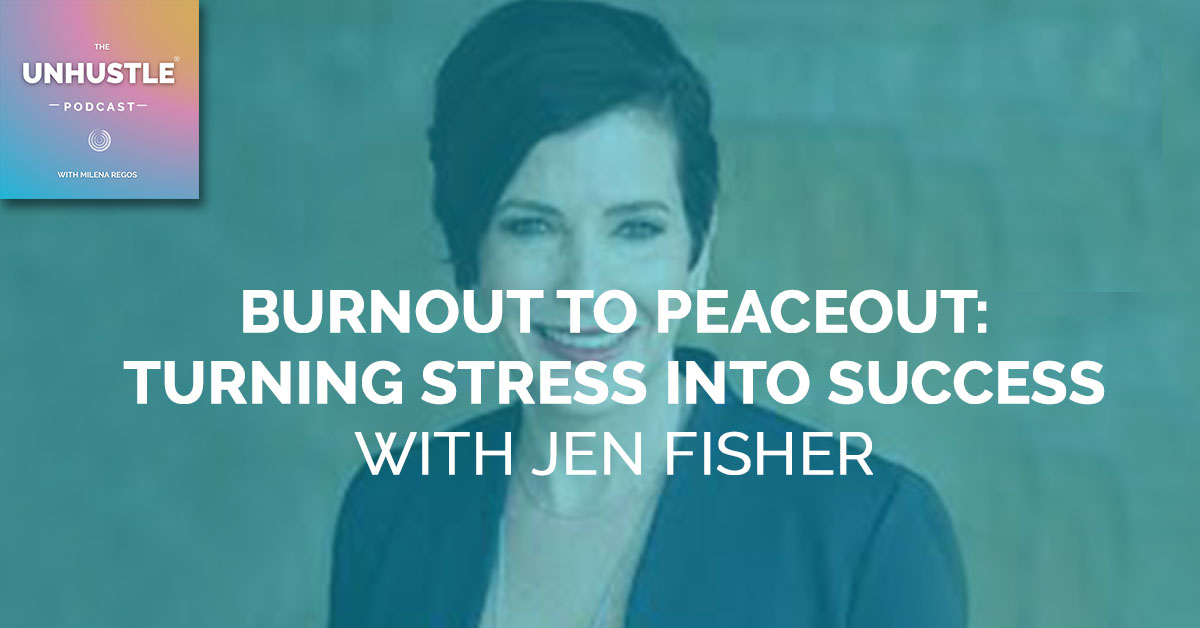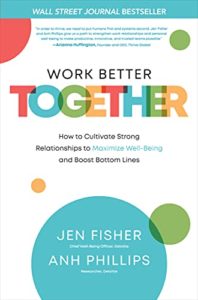
Is burnout the end of a productive work streak, or is it the starting point for growth? Dealing with burnout entails more than its discovery. Milena Regos sits down with Jen Fisher, the Chief Wellbeing Officer at Deloitte, to talk about how she turned her burnout into an opportunity. Jen takes us through her personal detox experience and how she managed to distinguish her purpose from her job. Listen to Jen’s top tips for integrating well-being into the workplace and your personal life.
—
Listen to the podcast here
Burnout To Peaceout: Turning Stress Into Success With Jen Fisher
How To Integrate Well-Being Into Your Work Day And Workplace
Milena [00:00:01]: I am sitting down with Jen Fisher, the Chief Well-being Officer of Deloitte. We discussed how she turned her burnout into an opportunity, her digital detox experience and her tips for integrating well-being into the workplace and your personal life.
—
Milena [00:01:16]: Jen, thank you so much for taking the time. I appreciate it. I know we’re all busy. I value your opinion and showing up to The Unhustle community. I want to kick it off by saying congratulations on the book.
Jen [00:01:30]: Thank you.
Milena [00:01:32]: I know you just hit a couple of bestseller lists, so now, you’re officially a bestselling author.
Jen [00:01:39]: It’s a very cool feeling. Thank you.
Milena [00:01:42]: That’s a great accomplishment. How does it feel to have such a big accomplishment under your belt in such challenging times?
Jen [00:01:50]: Putting the challenging times aside, I’m not sure that I ever dreamt of the fact that I would be a bestselling author. It is pretty cool. I will say that, like many things during the pandemic, it’s going on the list of things that we need to celebrate that we haven’t gotten to celebrate in the way that we want to. It’s a pretty amazing feeling. Staying true to the concepts of unhustle, I probably need to do a better job of stepping back and letting myself celebrate it, feel it and let it soak in.
Milena [00:02:23]: You pushed hard to get the book going, but then you went on a ten-day digital detox retreat.
Jen [00:02:29]: I did, yes.
[bctt tweet=”Sleep and rest don’t come easy when you’re struggling with your mental health.” username=””]
Milena [00:02:37]: I want to get into that experience and your light bulb moments from that because that’s where a lot of the high moments happen. Let’s take a step back, and for those who don’t know you, you have one of the coolest titles, Chief Well-being Officer. In my book, you’re on the pioneers. That came as a result of burnout and you’ve been with Deloitte for many years. Tell me the story. How did you come up with the title?
Jen [00:03:15]: I didn’t come up with the title. Our Former CEO, Cathy Engelbert, who is now the Commissioner of the WNBA, is the one that coined the title of Chief Well-being Officer. She went on after Deloitte to become the commissioner. It’s a pivotal and critical part of my success and the focus that we have at Deloitte on well-being.
I’ve been here for a long time. A few years ago, I did find myself completely burnt out to the point where I couldn’t get out of bed or engage in work or in life in any meaningful way. I had let myself go that far or that long without dealing with my burnout. One of the main reasons is that I process burnout as a failure because I looked around and everybody else seemed to have it together.
Everybody else seemed to be able to show up to all the demands and all the roles in their life and I couldn’t. I kept kicking the can down the road saying, “I’ll rest when this project is over or I’ll sleep on the weekend.” I was struggling with my mental health, with depression and anxiety. For anybody that can relate to that, sleep and rest don’t come easy when you’re struggling with your mental health. It was a whole bunch of compounding factors that forced me to have to take time off. I didn’t have much of a choice.
In doing that and in getting well, I became very passionate about the fact that this is no way to live and we shouldn’t be okay with giving so much to work and sacrificing so much else related to our life, our personal health and well-being that we end up at burnout. That created my personal mission. I didn’t think that I was going to stay at Deloitte. I was prepared to resign and leave. That’s when I went into my leader’s office to do and she pushed back on me. She basically said, “You’re not leaving. If you need this, then everybody else at Deloitte needs it too.” That started the journey of well-being at Deloitte and the genesis of the role that I’m in now.
Milena [00:05:23]: Are you still happy doing it?

Work Better Together: How to Cultivate Strong Relationships to Maximize Well-Being and Boost Bottom Lines
Jen [00:05:25]: I am still happy doing it. I get to live and work my passion and purpose every day, but it still works. One of the things that I personally struggle with is I’m so passionate about it that I oftentimes don’t say no when I should say no. I oftentimes need to take a dose of my own medicine and not just preach but practice what I preach or so they say. Because I’m so passionate about it and there’s so much research that shows that people that are very passionate about their jobs or high performers are at a higher risk of burnout because I want to say yes to everything. Usually, my husband is the one that reminds me that I’m saying yes to too much and then I’m like, “Okay. I got it.”
Milena [00:06:18]: I’m going to speak in generalizations, but I see a lot of people in that wellness and well-being space who are passionate about helping, serving and leading who don’t necessarily walk the talk. At least that’s what I’m seeing from a lot of the people I speak with. I see you being on Instagram, showing, leading and publishing all these amazing articles in the book. I have no idea what the rest of the job entails. I’m sure it’s a lot more than what I’m seeing. What is a day in the life of Jen and how do you walk the talk?
Jen [00:06:58]: First of all, all of those things that you mentioned, plus the things that I do internally for my day job don’t happen without other people and don’t happen without having an amazing team. That is certainly a lesson learned from my own burnout is that you really can’t do it all. There are lots of tips and tricks especially related to social media, that you can deploy, which means you don’t always have to be on social media even though you might appear to be. There are some things that happen in the background that I’m not always on social with. For me, a day in a life, first of all, sleep and exercise are non-negotiables for me.
If you do follow me on social media, I post my workouts sometimes but not all the time. I’m not one of those people that post myself all the time, but that’s okay if you do. I do not negotiate my sleep away. It doesn’t matter who you are or where I am or my friends at home. There’s been a running joke for many years that I do the Irish exit. I’m out. I’m there one second, I don’t even say goodbye. I just leave. When I used to travel or when I’m traveling for work, my team would send me to bed. They’ll be like, “Jen, it’s your bedtime. You need to go to bed.”
After so many years of being sleep-deprived and learning how it feels to be well-rested after a good night’s sleep, that’s part of the reason my team sends me to bed because you don’t want to be around me when I’m not well-rested. I am not a nice person to be. Exercise is important to me. I’m a lifelong athlete, but I think the older I’ve gotten, the exercise is a ritual and it’s about my physical health but also my mental health.
It helps me with my worry, anxiety and those things, so they’re in my calendar. The workout might move around from the morning to the afternoon but it always happens and sometimes it looks different. Sometimes it’s going for a walk or going to the gym. I’m very diligent about my calendar and what I allow on my calendar, what I don’t and what can be accomplished in different ways.
Not everything has to be a call or a video. What can I delegate and what do I say no to? You and I have talked about self-care and it has become this buzzword. The marketing gurus of the world have convinced us that self-care means that we drink a bottle of wine on Wednesdays and we take a bubble bath on Sundays, but self-care to me is a daily pursuit.
It often means saying no to things that we want to say yes to. It involves difficult decisions because it’s meant to protect our well-being. I am diligent about a handful of those things in my life because I have felt the effects when I don’t do those things. It starts to become pretty obvious to me. If my husband doesn’t point it out, I start to recognize it like, “I’m a little off. What’s going on with me?”
[bctt tweet=”People that are very passionate about their jobs are actually at a higher risk of burnout.” username=””]
Milena [00:10:02]: I had a night where I didn’t sleep well, and the next day, I couldn’t perform. I’m not myself. I feel like I’m drunk.
Jen [00:10:10]: The research would say that if you drive sleepy, you’re worse than being legally drunk.
Milena [00:10:18]: I try to stick to my sleep routine and make my sleep as non-negotiable as possible. Although I had been suffering from sleep issues, I think a lot of people these days are because there’s so much stress and anxiety.
Jen [00:10:32]: The modern world is not set up to help us get good rest. Pretty much everything about our bedrooms is wrong.
Milena [00:10:43]: You talked about integrating well-being in the flow of work. What do you mean by that?
Jen [00:10:51]: If you think about how organizations currently deploy or have well-being programs, it’s a program and it’s a layer on top of the way that we have worked for years and years. Even though there are a whole bunch of new things about the workplace and the ways that we’re working in terms of technology, we’re still working in a past Industrial Revolution way. The Fourth Industrial Revolution is all about technology, but I would argue that when it comes to humans in the workplace, the Fourth Industrial Revolution has actually either turned humans into machines or tried to turn humans into machines or get us to compete with our technology.
I think the same way about well-being. Historical well-being programs have been, “We have these programs and benefits available for you. We have these learning opportunities available to you, if and when you have time,” and whoever has time. The whole concept and the whole idea around embedding well-being into the flow of work are, how do you design your day, your week, your work and your workflows so that there are moments big and small, but mostly small throughout the day where you can step back. You can go for a walk, take a few deep breaths, do some meditation, step away from your laptop for lunch, go connect with a colleague, pick up the phone or whatever your definition of well-being is, but looking at the flows of work and saying, “Where are good points in my day?”
You can do that as an individual or as a team. You can look at team behaviors and norms. How do we do this and how do we empower this and give people agency to do this as a team also, what are our expectations? It’s being clear about expectations. At an organizational level, it’s looking at things like cultural or organizational barriers. The way that we use our technology, the expectations around our technology, the physical workspaces we’re in and how we get our work done from an operational perspective. Programs and policies that were designed and written eons ago that haven’t been updated don’t have the human at the center. There are a number of ways that you can look at doing this.

Burnout: You shouldn’t be okay with giving so much to work and sacrificing so much of your life, personal health, and wellbeing that you end up at burnout.
The most powerful to me and what we’ve seen is teams. It’s team behaviors and norms. Getting together as a team and saying, “What do we want our work to look like?” Teams are in large part empowered to do that even within an organization that perhaps isn’t doing that. What do we want our standard working hours to be? If we’re not working co-located, when are we generally online and reachable within a reasonable amount of time?
How do we get in touch with each other out of our standard working hours so we’re not all connected to email all the time or feel like we have to be? What do we want learning and development to be? Do we want it to be every other Friday from 2:00 to 3:00 PM? Carving out time in the workday and giving permission for people to carve out time in the workday to take care of themselves and to embed well-being behaviors throughout the day because we’ve lost that completely, almost.
We go from meeting to meeting. Even for those that are commuting or commuted before the pandemic, our commute times have now turned into time that we’re sitting in front of our computers where we weren’t doing that before. Even though the hours in the day that we are working or committed to work might be the same, the way we’re spending those hours is very different, and it’s burning us all out. We have to take a step back and design the way that we’re working in a different way.
Milena [00:14:34]: I know Deloitte has done some reports on well-being, and it shows up as the number two priority for employees, but it shows up as number nine for CEOs. Where’s the disconnect coming from when all the studies and the research points to the fact that well-being contributes to performance and how do we change this workism culture we find ourselves in? You talk about in the book about workism. I talk about it all the time with Unhustle. We know this focus on efficiency and productivity is not helping us in the long run. Help me figure out how are we going to go about changing culture?
Jen [00:15:16]: The report you’re referring to is the 2021 Global Human Capital Trends for Deloitte that I helped co-author. The context of that is that C-Suite executives were in the context of business transformation. In all the parts and pieces of business transformation, C-Suite executives were asked to rank all these things and then the workforce was asked to rank them. The good news is that it is now on the list. Workforce well-being has been part of our Human Capital Trends for a number of years but it’s in the top ten now.
We need to celebrate that because I would say prior to 2021 or 2020, it wasn’t even on the list of things that C-Suite executives were thinking about. At least now, it’s on the list. There still is a sizable difference between what the workforce wants and what the C-Suite wants. How do we close that gap? It’s a great question. We’re still figuring out at figuring it out because it is a huge transformation in terms of the way that we’ve always worked. It hasn’t been a leadership competency to truly care for the well-being of your team and of your workforce in the way that organizations are being expected to now.
I personally think that the workforce is going to force it because we’re seeing that. We’re seeing that with the Great Resignation. People are saying, “I don’t want to work for an organization that doesn’t value me as a human being inside and outside of the workplace. I don’t want to work for an organization that doesn’t provide me with the opportunities to do meaningful work, to develop and grow.”
The Great Resignation that you and I have talked about, in a lot of ways, it’s not about money the reason that people are leaving organizations. It is because they want a better life. The companies that are going to thrive are the ones that figure this out. I do think that well-being and the flow of work, autonomy, flexibility and hybrid work are the way of the future.
[bctt tweet=”Self-care is a daily pursuit. It involves difficult decisions because it’s meant to protect our wellbeing.” username=””]
In our book, we talk about the importance and the value of workplace relationships. We know that even though you can sustain and maintain relationships in a virtual world to develop those relationships, you do need to be together at some regular interval. That doesn’t mean everybody needs to go to the office 5 days a week for 12 hours a day. That only means that in the moments that matter, in those critical moments, in those critical milestones, in those critical touchpoints with your workforce, people need to be together because humans are wired for connection.
The organizations that get it right are going to be the organizations that value well-being, human connection or relationships, and create the space for that in the workday. It can’t be an expectation that comes on top of a 100% schedule of work. It needs to be part of the work and part of the expectation of being a colleague and being a leader in an organization.
Milena [00:18:24]: What I picked up from your book is you say becoming more human at work and nurturing the best in our relationships is the next great innovation. Let’s unpack this a little bit because I feel these new ways of thinking and new ways of working and transformation, which is what they call human culture. Let’s change this hustle culture to human culture. Let’s do it from a perspective of bringing in more humanity in the workplace but at the same time, the skills of the future are going to be more human skills, as you talk about in the book, which doesn’t happen while you’re sitting in front of a computer necessarily.
Jen [00:19:03]: They don’t happen when you’re sitting in front of the computer, and they aren’t the skills that are taught in business school or whatever school you go to. We have long called them soft skills, which I hate because they’re not soft. They’re human skills. They’re essential skills. We keep talking about them as the skills of the future. I think they’re the skills of now. We need leaders that know how to lead, develop grow and nurture people in a hybrid workforce, in a workforce that is living in a world that is constantly disrupted. We need leaders that know how to develop and build resiliency in their workforce. We need people that are well and taking care of themselves because change is hard.
Even though as humans, we’re constantly changing, when there’s this much disruption and this much transformational change, we don’t do well because it’s too much and it’s too big. The healthier we are mentally, physically, emotionally, financially or however you want to define it, the more adaptable we are, the more agile we are. Unfortunately, on a whole lot of levels, the pandemic has done us no favors. Pandemic fatigue is essentially burnout and it’s real. Business and the world are transforming at a time when all of us are feeling burnt out. It would be hard on a normal day. It’s unfortunately exceptionally hard right now.
Milena [00:20:40]: Do you have any specific strategies for becoming more resilient and being able to roll with the punches here?
Jen [00:20:48]: I’m taking a cue from you with meditation. The best strategies for becoming more resilient are well-being strategies. It’s taking good care of yourself, getting enough sleep, eating nutritious foods, spending time doing things that bring you joy, spending time with people that you feel connected with and that bring you a sense of belonging. That’s why we wrote the book because with the workforce prior to the pandemic, 50% of the people were saying that they were burnt out on the job or had been burnt out or experienced burnout more than once.
In my own mind, I think that’s probably a little low. During the pandemic, it’s close to 90% or 100% of people, but we know that human connection is an antidote to that. When we have people that we feel connected with, that we can reach out to and say, “I just need to vent. I need some help,” or to not feel alone. That’s one of the best antidotes to what’s going on and to building resiliency. Outside of that, it’s sleep. It’s good nutrition. It’s movement or exercise. It’s all of those things.

Burnout:People don’t want to work for an organization that doesn’t value them as human beings inside and outside of the workplace.
Meditation is incredible and working on your mindset, skills to work on your mindset and help you develop more of a growth mindset versus a fixed mindset. That’s a lot of work that I’ve had to do because I am perpetually a fixed mindset person. I get stuck. I get dug in on the way things have to be. I’ve done a lot of work there but I think the place to start is by taking care of yourself.
Milena [00:22:24]: Taking care of yourself is huge. It’s number one, but I also think what you’re doing with regard to having purpose could increase your resiliency. To the point of your book, people in relationships is huge for resiliency.
Jen [00:22:38]: Back to your point around workism, people define themselves by the job that they do. All of us, our jobs could go away tomorrow, so if your purpose in life is the job that you’re doing. When I coach people about finding purpose and meaning, the first thing I tell people is to separate it from the job that they do. For me, in my case, my purpose is the job that I do every day, but the current job that I do every day could go away and my purpose would still be to help people develop and find well-being in their life. We do have to remove that to say, “What matters to me in my life?”
I truly believe that you can pull purpose through in your job every day regardless of what your job is. If you’re interacting with other human beings, which most of us are, you can pull purpose through and it doesn’t matter what your job is but you do have to define that for yourself. I also think the thing about the purpose that is a myth is that purpose has to be some big world-changing thing that I’m going to do, otherwise, I don’t have purpose and it doesn’t have to be.
Your purpose can be doing something for your family or in your community or having a positive impact on every person that you’ve come in contact with. You can bring it down to a personal level. You don’t have to cure cancer, although I hope somebody does. Being a cancer survivor myself, we need those people, but I also think that what we get wrong about purpose is that people often feel like they have to do something that is world-changing or life-changing to have a purpose, and that’s not true.
Milena [00:24:20]: When I tried to discover if there is a bigger purpose for me than doing marketing, which is what I used to do in my career, I went down on this big self-discovery journey. I got deep into what are my values and what do I want to do, what are my talents and what is my calling? I read a bunch of books and did a whole bunch of research.
All of these started by disconnecting from technology and going on a ten-day digital detox, which turned out to be a digital detox. I didn’t plan it that way. I want to go back to your experience because sometimes I feel like perspective-shifting happens during these experiences. What I heard from you, I know it wasn’t only no internet, but it was like no sugar. It was a big reset for you.
Jen [00:25:05]: It was a full detox with no sugar, alcohol and caffeine. It was all vegan. I pretty much spent the majority of the day outdoors being active. There was no Wi-Fi. It was strongly discouraged other than talking to your family or calling home every once in a while. I’ve never done something like that before, but I have read about it. I’ve talked to others. You and I talked before I went, and my two biggest fears were no caffeine and Wi-Fi.
[bctt tweet=”The modern world is not set up to help people get good rest.” username=””]
Milena [00:25:38]: How did you do?
Jen [00:25:40]: I did great on both of those. With no caffeine, the second day, I had a headache for a little while, but then that subsided. The no Wi-Fi and no technology was actually a lot easier than I thought it was going to be, but I also didn’t leave it to chance. I set myself up for success. My team and I had a conversation before I went out, and this is now a best practice that we’re going to employ for everybody on my team that goes on PTO.
We were like, “Remove me from all email strings, remove me from any notifications in teams or any other platforms that we use. Keep a running list of things that we need to connect on or things that happened while I was out.” I didn’t have that FOMO in my head of like, “I’m going to come back to it.” For me, one of the excuses why I’ve always checked email on vacation is that I didn’t want to come back to 16,000 emails in my inbox because that would be stressful. Instead, I’m going to clear my inbox once a day, but I would tell people that work for me, “You don’t have to check email while you’re on PTO. I’m going to do it because it works for me.”
I realized that as a leader, you’re not walking the talk. If you’re saying one thing and you’re doing something else, people are like, “I hear you and you do respect me when I’m out. I don’t check email, but if I aspire to be in a leadership role one day, does that mean that I do need to check email?” That was a big a-ha for me a while back. We talked about it. They removed me from all communications.
That doesn’t mean that I didn’t get any emails, and we’ll talk about that, but at least in my mind, I was like, “They’re not going to be emailing me and they’ve got this.” Part of it too, as a leader or a colleague, is trusting your team. They have your back and they can do the work. They don’t need you. From an ego perspective, that’s sometimes hard to get over, but you get over it. I did a full digital detox of my phone. I removed apps and I turned off all of my notifications. I moved social media into a folder on the last screen and all of those things. I made my phone something where I could text home to my husband every night and be like, “I’m still alive. I love you. Good night.”
That was the only communication that I did. I thought it was going to be a lot harder but it was pretty freeing. The first two days I was like, “This is weird. What am I supposed to do with myself when I’m not on my phone?” I brought books and honestly, from being outdoors all day, exercising, doing yoga and all the things that we did, everybody was in bed asleep by 8:00 or 8:30 anyway. I was so tired that I didn’t have a desire to check my phone or to be on social media or anything. I also mentally prepared myself for it, and that’s important.
You talked about the a-has. When I was on the airplane home, I downloaded my emails and I will tell you that about 40% to 50% of the emails that I deleted were reply to all messages of people saying things like, “Thank you. I got it. I’m on it.” I’m starting a campaign and I think you’ll join me like, “Death to reply to all.” The reply to all button needs to go away or there needs to be a pop-up that says, “Are you sure you want to reply to all?” If you had to populate each one of these names individually, would you put every single one of these people in your Reply To All? The answer every single time is no. Why do we do it? Because it’s a reflex.
We could put something on the bottom of our email signature that says, “I want to do this. Don’t worry about replying to me and thanking me. I know that you’re grateful.” Making that assumption like, “I don’t need to hear back from you unless you need something else or unless we need to have a dialogue. You don’t need to say thank you.”

Burnout: Even though you can sustain and maintain relationships in a virtual world, to really develop those relationships, you do need to be together in some regular interval.
Milena [00:29:31]: It’s an awesome campaign, Jen, and I’m definitely going to join you. I’ve been sabotaging emails for years now. Going back to my corporate days, when I explained to my boss that I don’t need to be CC’d on every email or responded to every email. I also don’t need to be in every meeting. I got myself out of the meetings on Fridays, and I started working from home way back in the day. I tried to outsource my job to India, but he wouldn’t go for it. It wasn’t going to work.
Jen [00:29:59]: When you talk about well-being and the flow of work, those are things that don’t cost any money. It’s habit and technology that enables it. You said, “I don’t need to be in every meeting.” One of the things with technology is that it’s easy to invite everyone and anyone to a meeting, and that person feels obligated because they got invited. They feel like they need to say yes to that meeting when they may or may not need to be there.
When you have a meeting, especially a virtual meeting with 25 people, nothing gets done. There are only 3 or 4 people that are talking, and the rest of the people are listening. Can they read notes? Can they listen to it later? Can you follow up with action items? We need to rethink meetings the way we’re working. Have you read Cal Newport’s A World Without Email?
Milena [00:30:48]: Yeah.
Jen [00:30:51]: That in itself is a big light bulb. The email was never meant to be used the way that we’re using it, and it is burning us all out.
Milena [00:31:01]: The other thing I’m hearing, at least from people and some of these people who may work with you or close to you, is that basically when they’re in the meeting, they still have to get their work done, so they continue to work so they’re not paying attention to the meeting.
Jen [00:31:14]: They are not paying attention because multitasking is just rapid task switching.
Milena [00:31:19]: They are also not working either.
Jen [00:31:20]: If they are working, the quality of their work is not going to be great. You asked me what about my well-being practices. If you look at my calendar on any given day, I have blocked time for focus time. I have time for breakfast, lunch, dinner, two snacks, workout and bedtime, but I blocked focus time. My executive assistant is very good. She knows she will not schedule anything there without asking me.
[bctt tweet=”Humans are wired for connection. People need to be together during critical milestones and during moments that matter. ” username=””]
We move it around if we need to, but it’s chunking up your day as much as possible to say, “I’m going to give this 30 minutes or this hour to checking email. I’m going to give this hour or two to focus time.” That’s not possible for everyone all the time, every single day. It’s not possible for me every single day, but more often than not can I make it work, and it makes a huge difference.
Milena [00:32:11]: Thank you. I do the same. I don’t schedule any meetings or phone calls in the morning, but I’m in a different situation, and for a lot of people who are people-pleasing, it’s hard to set up these boundaries. It’s hard to push back, especially when there’s an opportunity, including a lot of entrepreneurs. It’s hard to say no. I realized I have to be happy with what I’m accomplishing on my terms and not be constantly striving, competing and comparing, but that’s hard. My next question to you is how do you define success?
Jen [00:32:54]: If I look back in terms of what we’ve accomplished at Deloitte from a well-being perspective, are we all the way there? No. We may not ever be all the way there because well-being is an evolving journey for every individual and an evolving journey for every organization. For me, it’s forward progress in the role that I’m doing, but in my life, it is about the individual impact. The most meaningful things to me are the messages or the interactions that I have with people that say, “You did this, you said this or you recommended this. I did it and it made a huge impact on me.”
It goes back to the human impact. I think personal success is feeling like I’m contributing to the greater good of the world regardless of how big or small, and that changes. It’s up and down, but also taking care of myself and my family. That has a whole new meaning. As I said, I’m a cancer survivor and that, in a lot of ways, changed my perspective too. Success to me is sticking to my boundaries and making sure that I’m caring for my self-care, non-negotiables and things like that. There are different types of success, but I will say that one of the biggest factors of my burnout when I did burn out was that I had no definition of success for myself.
I was looking around saying, “That person is successful. I’m going to do that.” I was doing a whole bunch of things and I was perhaps succeeding at them, but they weren’t my definition of success. It was what I perceived other people that I thought were successful were doing. It wasn’t intrinsic. It was this external definition of success that I was always striving for. Nothing was ever good enough that I was always striving to be whatever the next thing was that I was doing. Do I still suffer a little bit from that now? To be honest, yeah.
Milena [00:34:58]: It’s hard to change that behavior, to be honest with you. I’ve learned to realize that I’m okay with it as long as I’m aware of it, and I know what to do when I start going down that path. Bottom line, Jen, in one sentence, combine work and life success. You and I have talked about that there’s no such thing as work-life balance and work-life integration. It’s all living.
Jen [00:35:35]: My mission in life is to be an example of what living a life of well-being looks like for other people so I can inspire others.
Milena [00:35:47]: You’re very purpose-connected.
Jen [00:35:50]: That’s inside or outside of work.
Milena [00:35:56]: Jen, I can keep talking to you forever and ever, for weeks and months. Good luck with your continued success, which I’m sure will be with the book. If I can help in any way, let me know. Keep doing what you’re doing and keep smiling, exercising and inspiring me.
Jen [00:36:28]: I will do all of those. Thank you very much. We’ll talk soon, I’m sure.
Milena [00:36:32]: Thank you, Jen. Have a good day.
Jen [00:36:33]: Take care. Bye-bye.
Important Links
- Deloitte
- 2021 Global Human Capital Trends
- A World Without Email
- Work Better Together
- Diving Deeper: 5 Workforce Trends to Watch in 2021
- Unhustle
- Unhustle Retreat
- Burnout to Peace Out
- Simple Life Retreat
- Instagram – Jen Fisher
- Twitter – Jen Fisher
- WorkWell Podcast
- @Unhustle – Instagram
- @Unhustle – Twitter
- Unhustle – Facebook
About Jen Fisher
 As the chief well-being officer in the US, Jen drives the strategy and innovation around work-life, health, and wellness to empower Deloitte’s people to be well so they can perform at their best in both their professional and personal lives.
As the chief well-being officer in the US, Jen drives the strategy and innovation around work-life, health, and wellness to empower Deloitte’s people to be well so they can perform at their best in both their professional and personal lives.
Search
IDEAS





+ Show / Hide Comments
Share to: